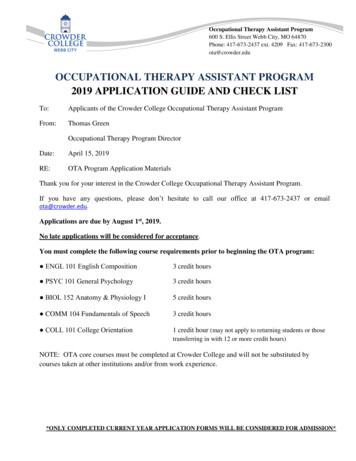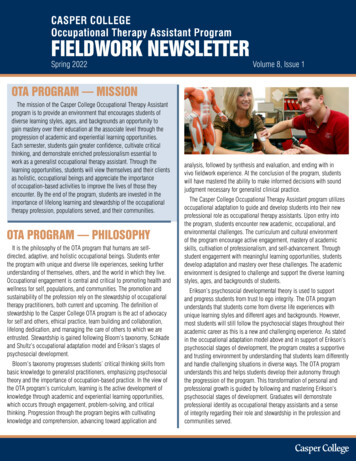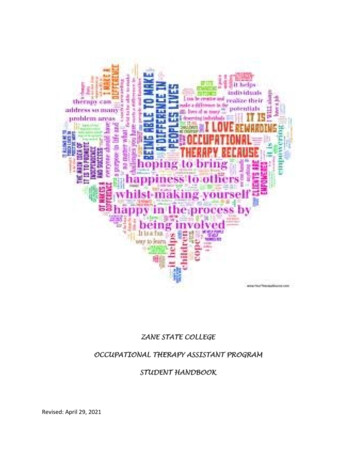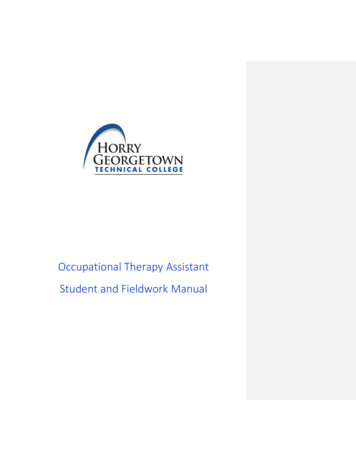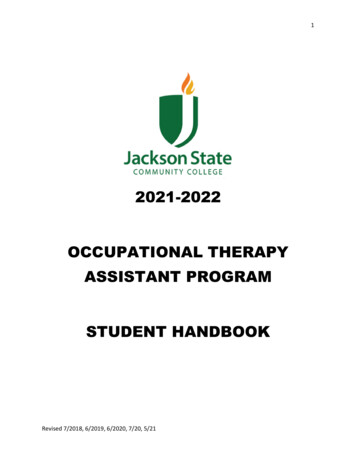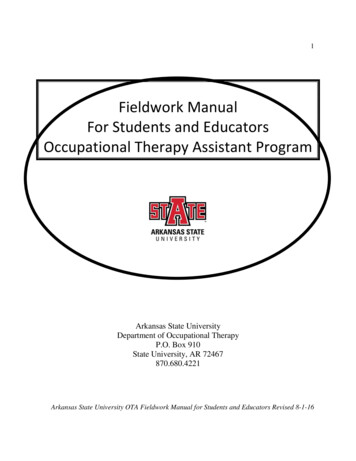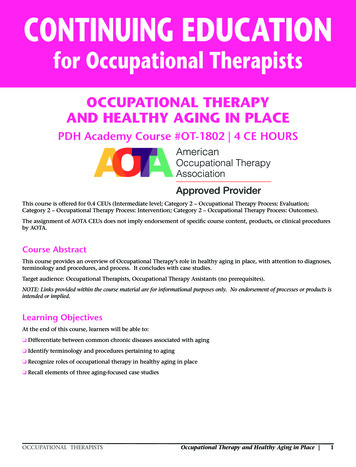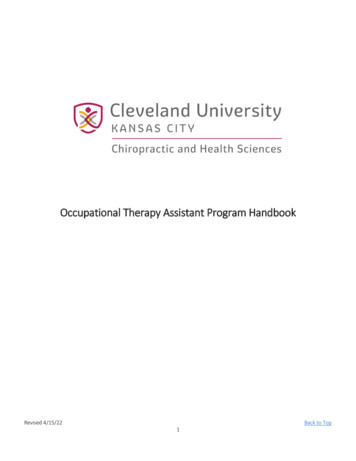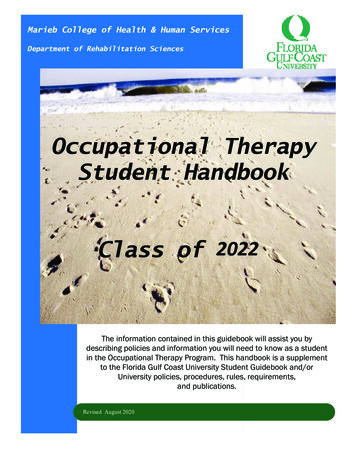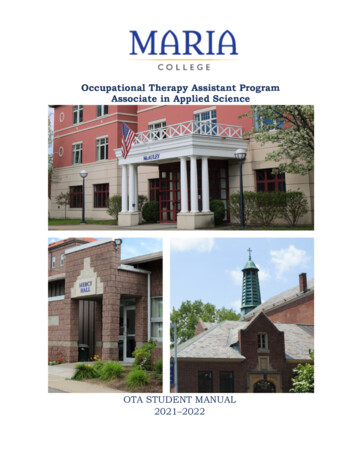
Transcription
Occupational Therapy Assistant ProgramAssociate in Applied ScienceOTA STUDENT MANUAL2021–2022
MARIA COLLEGEOCCUPATIONAL THERAPY ASSISTANT PROGRAMSTUDENT MANUALTABLE OF CONTENTSWelcome .Mission and Values of Maria College.Mission of the Occupational Therapy Assistant Program . .Definition of Occupational Therapy .Faculty. .Introduction. .OTA Program Philosophy. .OTA Program Curriculum Design.OTA Program Curricular Design by Course Sequence, First Year.OTA Program Curricular Design by Course Sequence, Second Year.OTA Program Content Threads.OTA Program Goals.Student Learning Outcomes . . Fieldwork. .Statement of Confidentiality. .Scheduling of Courses. .Student Responsibilities. .Professional Behaviors .Criteria for Written Work. .Grading. .Grievance Procedures. .Probation. .Student OT Association. .AOTA Assembly of Student Delegates OTA Program Additional Fees. .Membership. .Credentialing. .Appendix A - Day Sequential Course of Study. .Appendix B - Weekend Sequential Course of Study. .Appendix C - Student Professional Behaviors Assessment. .Appendix D - Student Pledge of Professionalism . . 425The Occupational Therapy Assistant Program is accredited by the Accreditation Council for Occupational TherapyEducation (ACOTE) of the American Occupational Therapy Association, Inc. (AOTA)* along with the New YorkState Department of Education. The OTA Program will be re-accredited in the 2027-2028 academic year.* American Occupational Therapy Association6116 Executive Boulevard, Suite 200Bethesda, MD 20852-4929(301) 652-6611https://acoteonline.org-1-
Occupational Therapy Assistant ProgramDear OTA Student,WELCOME to the Maria College Occupational Therapy Assistant Program. This Student Manualpresents the philosophical base of the Occupational Therapy Assistant Program, providesdepartmental policies and procedures, and outlines our overall expectations for OTA studentlearning. This Manual should be used in conjunction with the Maria College Student Handbook tohelp you identify and achieve your academic goals and beginning professional responsibilities. Werecognize that you are investing your time, interest, attention, energy, and financial resources inyour future. We encourage and expect that you will be an active participant in this formal learningprocess that serves as the beginning of lifelong and continuous learning related to your chosenprofession.Please keep this Manual for reference throughout your Occupational Therapy Assistant education;you will be notified of policy changes when they occur. You are responsible for the information,policies and procedures it contains. We encourage you to read this Manual and to express anyconcerns as they arise.The Occupational Therapy Assistant Program Faculty*************************OTA Student Manual DisclaimerEach student at Maria College is responsible for reviewing, understanding, and abiding by the College’s regulations, procedures,requirements, and deadlines as described in the College Academic Catalog, Student Handbook, and Departmental Student Manual.Notwithstanding anything contained in this OTA Student Manual, MARIA COLLEGE expressly reserves the right, wherever itdeems advisable, (1) to change or modify its schedule of tuition and fees, (2) to withdraw, cancel, reschedule or modify anycourse, program of study, degree or any requirement in connection with the foregoing, and (3) to change or modify any policy.Please be advised that, due to printing deadlines, information in this Student Manual may be outdated. It is the responsibility ofeach student to ascertain current information that pertains to the individual’s program, particularly with regard to satisfaction ofdegree requirements, by consultation with the student’s advisor, the office of the Academic Dean and other appropriate officessuch as the Registrar or Financial Aid. In preparing this Manual, efforts are made to provide pertinent and accurate information;however, MARIA COLLEGE assumes no responsibility for errors or omissions.Student ResponsibilityThe student is responsible for being aware of the information provided in this Manual. Specific student responsibilities areoutlined on pages 16 -19.Non-Discrimination PolicyMaria College is a non-profit, independent, co-educational institution which does not discriminate in its enrollment or employmentpractices for any reason including race, sex, color, national origin, creed, sexual orientation, mental or physical disability.Information about the services, activities and facilities accessible to the handicapped may be obtained in the Office of StudentSupport, Mercy Hall.-2-
The Maria College MissionMaria is a Catholic college sponsored by the Sisters of Mercy and animated by the Mercycharism. It provides career-relevant, opportunity education in the context of the CatholicIntellectual Tradition to all who can benefit from it. Maria is committed to outstanding andholistic student support services, financial sustainability and the purposive use of evidence todrive institutional renewal and student success. Maria seeks to foster graduates who recognizeand respect the dignity of every human person and who will transform their knowledge andskill into caring and compassionate service to others.Maria College ValuesOccupational Therapy Assistant Program MissionThe mission of the Occupational Therapy Assistant Program is to help each student fulfill his orher educational and career goals by providing quality academic and clinical education. Thiswill prepare the graduate to provide holistic and caring service to individuals of all ages andabilities from diverse cultural and socio-economic backgrounds.The Program is based on the altruistic and compassionate values shared by the OccupationalTherapy profession, Maria College and the Sisters of Mercy which acknowledge thesignificance of human differences and promote respect for the dignity of the individual.The curriculum builds upon an interdisciplinary foundation of knowledge from the sciences andliberal arts to graduate entry-level practitioners who embody the health-promoting propertiesof engaging in occupations, consistent with the philosophy of the profession.DEFINITION OF OCCUPATIONAL THERAPYOccupational therapy is a science-driven, evidence-based profession that enablespeople of all ages to live life to its fullest by helping them promote health and prevent,or live better with, illness, injury or disability.American Occupational Therapy Association-3-
OTA Program FacultyMaria CollegeMcAuley Building308 South Manning Blvd.Albany, NY 12208Scott L. Homer, MS, OTR/LOTA Program DirectorAssistant ProfessorMcAuley 209(518) 861-2546shomer@mariacollege.eduFoundations of Occupational Therapy IFoundations of Occupational Therapy IIIntroduction to FieldworkOT in Developmental Disabilities PracticeOT in Physical Dysfunction PracticePreparing for PracticeMeghan DeNitto, MPH, BS, COTA/LOTA Academic Fieldwork CoordinatorInstructorMcAuley 212(518) 861-2549mdenitto@mariacollege.eduIntroduction to FieldworkFieldwork I - PsychosocialFieldwork IILisa Deserre, BS, COTA/LInstructorMcAuley 211(518) 861-2547ldeserre@mariacollege.eduOT Skills & Application IOT in Psychosocial Dysfunction PracticeDanielle LeBeau, BS, COTA/LAdjunct Instructordlebeau@mariacollege.eduFieldwork I – PsychosocialFoundations of Occupational Therapy IFoundations of Occupational Therapy IIOT in Developmental Disabilities PracticeHolly Lockrow, MS HSA, OTR/LAdjunct Instructorhlockrow@mariacollege.eduOT in Developmental Disabilities PracticeOT Skills & Application IILinda VanDeusen, BS, OTR/LAdjunct Instructorlvandeusen@mariacollege.eduOT in Psychosocial Dysfunction PracticeOT Skills & Application IILisa Drake, MS, OTR/LAdjunct Instructorldrake@mariacollege.eduFoundations of Occupational Therapy ICarissa O’Rourke, MS, OTR/LAdjunct Instructorcorourke@mariacollege.eduOT in Physical Dysfunction PracticeAnnMarie Chiappinelli, MS, COTA/LAdjunct Instructorachiappinelli@mariacollege.eduFieldwork I – PsychosocialOT in Physical Dysfunction PracticeOccupational Performance Across the Lifespan-4-
Occupational Therapy Assistant ProgramStudent ManualINTRODUCTIONThe Occupational Therapy Assistant (OTA) Program at Maria College was founded by Bearldean B.Burke, OTR/L, FAOTA, in 1975 and graduated 12 students in 1977. Following Bearldean’s retirement in1988, Sandra C. Jung, OTR/L chaired the program until 2010 and expanded the flexibility of the courseofferings by adding a weekend option beginning in the fall of 1995. Maria College has since graduatedover 1100 OTAs who are employed throughout the country. Many of the graduates have continued theireducation, completing bachelors, masters or doctoral degrees in occupational therapy and related fields.The OTA Program is designed to be completed in two years (or 4 semesters*) of day study; this consistsof three full-time academic semesters and one full-time clinical semester. The weekend option spansthree years (9 semesters*), with summers included, and is designed to be a part-time program until thefinal full-time clinical semester. The academic semesters incorporate clinical assignments, field trips, andlaboratory experiences to help the student develop an appreciation for the many facets of occupationaltherapy, as well as an understanding of the skills needed to work as an Occupational Therapy Assistant.Concurrent clinical experiences help the student integrate academic learning with practical application.During the final semester, the student participates in Level II fieldwork, two full-time clinical experiencesequaling a minimum of 16 weeks which spans a period of four to five months. Level II fieldwork istypically completed just prior to commencement and must be finished within 18 months of coursework.The sequential course of study for the OTA Program is outlined in Appendix A and B. Students maychoose to take day, evening, online or weekend sections for required courses. Refer to each semester’sCourse Schedule (available on MyMaria or in the Registrar’s Office, Main Building – room 108) todetermine offerings and availability. Please note that all Fieldwork II assignments (OCT 216-217) mustbe completed during weekday hours.Upon completion of the program, the graduate will have met the entry-level learning objectives based onthe 2018 Educational Standards set forth by the Accreditation Council for Occupational TherapyEducation (ACOTE)** and those of the New York State Department of Education. Maria College OTAgraduates are eligible to apply for the required legal and professional credentials to practice as anOccupational Therapy Assistant. Additional information about State licensure and the National Board forCertification in Occupational Therapy (NBCOT) examination can be found on page 21 of this Manual.* This timeframe does not include any prerequisite coursework that may be required as determined by the AdmissionsOffice as part of the application/acceptance process.**The Accreditation Council for Occupational Therapy Education (ACOTE)American Occupational Therapy Association (AOTA)6116 Executive Boulevard, Suite 200Bethesda, MD 20852-4929(301) 652-6611https://acoteonline.org-5-
OTA PROGRAM PHILOSOPHYThe Occupational Therapy Assistant Program at Maria College recognizes that the OT Assistant is anintegral part of a growing profession that works in many practice arenas and with individuals andpopulations of all ages from all cultures and backgrounds. The student is best educated in a programencompassing a wide spectrum of contributions from the liberal arts, biological and behavioral sciences,and humanities, combined with the theories and skills that support the premise that engagement in humanoccupation promotes health, wellness and the ability to adapt to one’s changing circumstances. Theeducational process to become an Occupational Therapy Assistant requires the acquisition of a specificbody of knowledge and practical skills that can be heard, seen and touched in order to achieve learning andunderstanding. Knowledge of the basic theoretical concepts about human movement, growth anddevelopment, adaptation, and various medical, developmental, and psychosocial conditions and resultingdysfunction combined with knowledge of occupation, ethics, professional issues, skills, and activityanalysis allows the future Occupational Therapy Assistant to apply the science of clinical reasoning to theart of practice.Integral to the Maria College OTA Program’s philosophy of learning is the belief that learning should havemeaning to the student and that “learning by doing” through the participation in purposeful activities isessential to the student’s ability to adapt and to accommodate new learning into existing schemas ofknowledge. This is accomplished in a supportive environment that allows the adult learner to rely onhis/her intrinsic motivation and to build on existing knowledge and skills. The student gains professionalknowledge, skills, and behaviors essential to become an evidence-based Occupational Therapy practitionerwith an understanding of his/her personal and professional values, a responsibility to provide service toothers and a commitment to lifelong learning.The philosophical rationale for curriculum is grounded in the combined theories of the Occupational Therapyprofession and the educational theorists Piaget, Dewey, and Vygotsky. Occupational Therapy values the individual’spursuit of independence through the use of occupation in context of the environment and as related to life roles.Piaget’s developmental, cognitive, and constructive based theories state that environment and opportunities formultisensory repetition enhance the ability to learn. Dewey, grounded in pragmatic views of ethics, aesthetics, andreligion, provides a theoretical basis for “learning-by-doing” which leads to the ability to problem solve real lifesituations and is congruent with the Maria College Mission. Vygotsky provides the social cognitive theories relatedto the belief that learning takes place in a social context through problem solving experiences shared with others.All three of these educational theorists believe that the learner constructs his or her own meaning from new learningopportunities and experiences in order to build upon existing schemas in a spiraling manner.References:Maria College OTA Program Self-Studies, 1993, 1995, 2000, 2010, 2020.Philosophy of Occupational Therapy Education, AOTA, The Commission of Education, 2018.The Philosophical Base of Occupational Therapy, AOTA, 2017.-6-
OTA PROGRAM CURRICULUM DESIGNThe curriculum design of the Occupational Therapy Assistant Program is indebted to the Sisters ofMercy, the founders and sponsors of Maria College. The curriculum encompasses the humanitarianvalues and beliefs that the Sisters of Mercy have bestowed upon Maria College as well as the corevalues and philosophy of the Occupational Therapy profession. Students arrive at Maria Collegeaspiring to begin a new career path, and the OTA Program recognizes that each individual bringsqualities into the classroom that will strengthen the fabric of the curriculum. Important to the basis ofeducation is prior knowledge, especially in the areas of health and illness, communication and naturalsciences, which each student brings to the classroom. This foundation provides a wealth of resourcesfor a stable, yet dynamic, curriculum that reflects the changing needs in the community.Through rigorous academic preparation, the Maria College OTA student progressively accumulatesa body of new information which culminates in the level II fieldwork experience. Here the student isexpected to assimilate this knowledge as it applies to the practice of Occupational Therapy. Maria’sOTA Program has a broad base originating with the curriculum threads found in the required liberalarts, biological and behavioral science courses that form the foundation of the Occupational Therapycourse work. The OTA curriculum grows from these foundational threads with subsequent coursesbuilding on previous learning. A primary thread in the OTA core curriculum is Occupation, which isidentified as integral to the profession and therefore to OTA education. The concept of occupation,with its philosophy, attributes, personal meaning and health benefits derived through purposefulengagement, are interwoven into all of the OTA courses.The OT profession's use of occupation forms the foundation of the Maria College OTA Program’scurricular threads. These threads give future practitioners vital information and skills necessary toapply and adapt occupations for improved function and quality of life for individuals who benefitfrom Occupational Therapy services. The following threaded themes are repeated and reinforcedthroughout the curriculum to provide both depth and continuity: Occupation Values and Ethics Health and Illness Therapeutic Skills, Analysis and Application Professional IdentityEach thread is given definition and character through the specific strands of information presented ineach course to enhance the development of clinical reasoning skills in preparation for level IIfieldwork and entry level practice. The descriptions and diagram on the following pages illustratehow these threads weave throughout the OTA Program. Ongoing feedback, provided by thecommunity of OT practitioners via clinical site visits, fieldwork evaluations, OTA Advisory Boardmeetings and employer surveys, is used to confirm, augment and modify the knowledge and skillcontent that enhances and strengthens the OTA program. This helps ensure that the Maria CollegeOTA graduate’s knowledge base is consistent with the demands of entry-level practice. The curricularthreads and related course content are congruent with best practice and the needs of the community.Ultimately, the educational threads of the OTA program lead to graduation. The arched ‘A’ motifreflected in the Maria College logo represents a symbolic arched doorway through which the OTAstudent passes into the community. Upon commencement, the graduate leaves the College to pursueemployment as an entry-level OTA, advance previous work roles or continue further education. Thepassage through this symbolic doorway indicates that the graduate has achieved the knowledge andskills necessary to provide caring service to others and has become an OTA practitioner. The doorremains open for OTA alumni to return to Maria College as they accept new responsibilities foreducating, mentoring and supervising future OTA fieldwork students, thus connecting and reconnectingMaria College with local and distant communities. In this way, the base of support for the Maria CollegeOccupational Therapy Assistant Program is constantly renewed and expanded.-7-
OTA PROGRAM CURRICULAR DESIGN BY COURSE SEQUENCE – FIRST YEAROT Skills and Application I (OCT 112) is a first semester course that introduces the student to theconcepts in the curriculum threads of occupation and therapeutic skills, analysis and application. It laysthe foundation for subsequent courses and develops the skills necessary to the role of the OTApractitioner. This course engages the students in a variety of occupations and purposeful activity usinghands-on experience with occupations and skills such as crafts, cooking and assistive technology.Foundations of OT I (OCT 114) is offered in the first semester, provides the foundation for the OTAcurriculum and is critical to the curriculum design in that it introduces the student to all the program’scurricular threads, making the initial links to the subsequent subjects which are expanded upon in thesecond and third semesters of the program. This course allows students to engage in treatment andassessment methods in areas of ADL and body function with individuals with cognitive and physicalillnesses and disabilities. The course provides students with application skills that will be required andreinforced on FW I and used as a foundation in subsequent OT courses including OT in PhysicalDysfunction Practice (OCT 214), OT in Developmental Disabilities (OCT 213), and OT in PsychosocialDysfunction (OCT 215).OT Skills and Application II (OCT 116) is taught in the second semester and reinforces the concepts ofthe curricular threads of occupation, professional identity and therapeutic skills, analysis and applicationintroduced in OT Skills and Application I (OCT 112) and Foundations of OT I (OCT114). This courseprovides instruction and experience in group dynamics and group process with an emphasis on choosingand modifying age-appropriate and culturally relevant play/leisure activities. These skills will be utilizedand further enhanced in fieldwork and OT courses (OCT 213 and OCT 215).Introduction to Fieldwork (OCT 117) is an overview and preparation for fieldwork that allows thestudent to integrate and accommodate all the concepts of the curricular threads presented during the firstacademic year. Students can build on previous knowledge and newly learned skills to broaden their viewsof the occupational therapy profession. Assignments provide the students with opportunities to help makemeaningful connections with their academic learning to see OT’s role within their local community.Occupational Performance Across the Lifespan (OCT 120) builds on the concepts of health andillness acquired in the anatomy & physiology courses (BIO 209 and 210), General Psychology (PSY100), and first semester OT courses (OCT 112 and 114). This course reinforces the curricular thread ofoccupation as seen throughout the life span and is a foundation for second year OTA courses includingOT in Developmental Disabilities (OCT 213), OT in Physical Dysfunction (OCT 214) and OT inPsychosocial Dysfunction (OCT 215). It meshes with the concurrent OT Skills and Application II (OCT116) class to help students choose age appropriate and culturally relevant play and leisure occupations.Foundations of OT II (OCT 121) is offered in the second semester as a direct continuation ofFoundations of OT I (OCT 114), building on the Program’s conceptual threads of health and illness,occupation, professional identity and therapeutic skills, analysis and application. This course allowsstudents to engage in treatment and assessment methods that were first introduced during OCT 114. Areasof human performance are addressed regarding evaluation, modification and application with individualswith cognitive and physical disabilities. This course prepares students for the rigor of their second-yearcourses, OT in Physical Dysfunction Practice (OCT 214), OT in Developmental Disabilities (OCT 213),and OT in Psychosocial Dysfunction (OCT 215) and ultimately Fieldwork II (OCT216 – 217).Additional required courses that support the curricular threads includes Anatomy and Physiology I(BIO209), Anatomy and Physiology II (BIO210), Introductory Kinesiology (BIO119), EnglishComposition (ENG 111), Critical Inquiry and Writing (ENG 211), General Psychology (PSY 100) and aPSY elective, Medical Terminology and Conditions (SCI 100), and Foundations in Social Justice (RES201). This Liberal Arts coursework integrates the Values and Mission of Maria College into the Associateof Applied Science OTA degree.-8-
OTA PROGRAM CURRICULAR DESIGN BY COURSE SEQUENCE – SECOND YEARFieldwork I - Psychosocial (OCT 210) provides opportunities for students to apply concepts of thecurricular threads developed in Introduction to Fieldwork (OCT 117), OT Skills and Application (OCT112 and 116), and Foundations of OT (OCT 114 and 121). This course allows students to collaborate ingroups and assume leadership roles planning and providing occupation-based activities for vulnerableolder adult populations in community settings. These opportunities provide students the ability to expandtheir repertoire of therapeutic skills, analysis and application and enhance their professional identity.Preparing for Practice (OCT 211) is taught in the third semester concurrent with the major OT theorycourses. It expands on the information introduced in Foundations of OT I and II (OCT 114 and 121) inthe areas of professional ethics, supervision, roles and responsibilities. New information about clinicalreasoning, quality assurance and understanding health systems regulatory agencies is presented. Studentsare given the opportunity to expand their professional identity by becoming more active in professionalorganizations, promotion of the profession and exploration of life-long learning. The role of the studentand Fieldwork Educator are discussed, and class activities prepare students for Level II Fieldwork andentry-level practice professional, ethical and management issues. Opportunities to promote the profession,develop a professional development plan and be actively involved in professional activities are reinforced.OT in Developmental Disabilities (OCT 213) is taught in the third semester and provides opportunitiesto enhance students’ understanding of the program’s curricular threads established in previouscoursework. Students develop a better understanding of the professional identity of the OTA and thevalues and ethics that guide practice in developmental and school-based settings first introduced inFoundations of OT I and II (OCT 114 and 121). This course builds on health and illness concepts toprovide further information about normal and abnormal growth and development, related diagnoses andsigns and symptoms. The labs emphasize the application of therapeutic skills needed to promoteeducational and play occupations previously introduced in OT Skills and Application II (OCT 116).Therapeutic techniques and a variety of assessment tools used to determine age level functioning,perceptual-motor and sensory-motor skills are introduced as preparation for Level II Fieldwork and entrylevel practice in a wide variety of developmental settings.OT in Physical Dysfunction Practice (OCT 214) is taught in the third semester and providesopportunities to enhance students’ understanding of the program’s curricular threads established from allprevious coursework. This course builds on health and illness concepts introduced in first year courses.Therapeutic skills including adaptive techniques, transfers, goniometry, manual muscle testing, andorthotics, introduced in Foundations of OT I and II (OCT 114 and 121) are further developed andstrengthened through hands-on opportunities to work with individuals with specific disabilities. Theunderstanding of the mechanics of the human body learned in Anatomy and Physiology I and II (BIO 209and 210) and Introductory Kinesiology (BIO 119) provides students with the ability to compare datagathered from measuring joint range of motion and muscle strength to expected norms. This allowsstudents to plan treatment goals and implement occupation- based treatments. This course providesinformation on concepts and practical skills in preparation for Level II Fieldwork and entry level practicein rehabilitation settings, long-term care facilities, outpatient clinics, and acute care hospital programs.OT in Psychosocial Dysfunction Practice (OCT 215) is taught in the third semester and providesopportunities to enhance students’ understanding of the program’s curricular threads established from allprevious coursework. Students utilize knowledge of human behavior and interpersonal skills frompsychology electives to engage clients in the therapeutic process and effectively develop working andtherapeutic relationships. Using knowledge of therapeutic skills, and analysis from OT Skills andApplication I and II courses (OCT 112 and 116), students apply group dynamics to plan, organize andlead skill and occupation based groups in class and during prior experiences and concurrently-runcommunity based assignments in Fieldwork I – Psychosocial (OCT 210). Written and oralcommunication skills are applied as the student interviews clients and health professionals to gatherinformation and to promote the profession both in the community and on campus. The course prepares thestudents to address psychosocial
The Occupational Therapy Assistant Program is accredited by the Accreditation Council for Occupational Therapy Education (ACOTE) of the American Occupational Therapy Association, Inc. (AOTA)* along with the New York . Maria is a Catholic college sponsored by the Sisters of Mercy and animated by the Mercy charism. It provides career-relevant .
